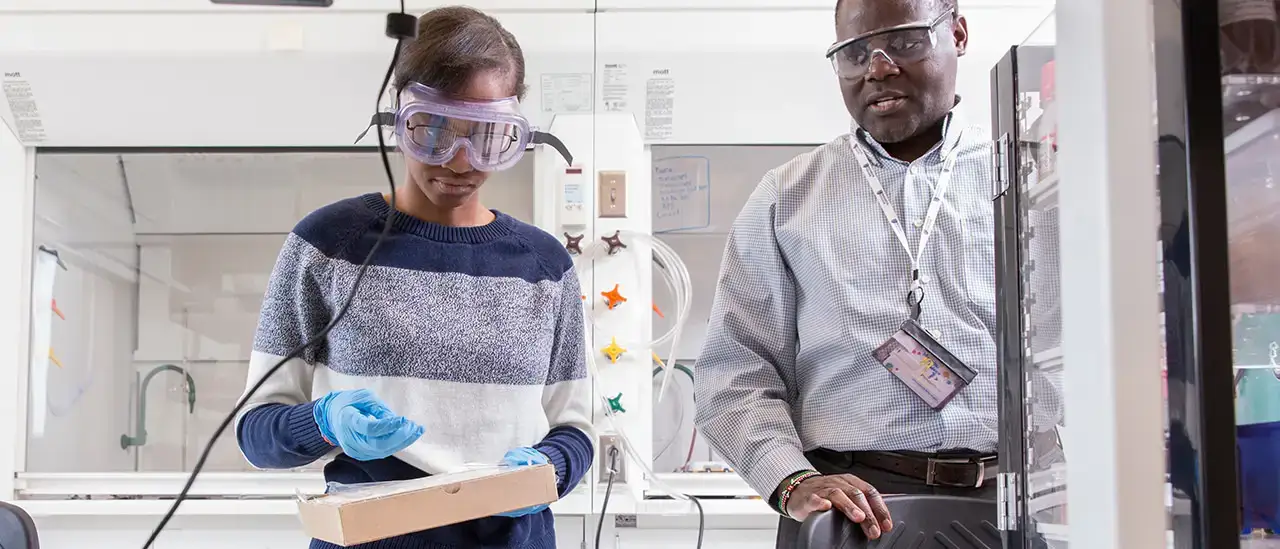SUNY Oneonta's Office of Health Careers provides specialized guidance and support for students preparing to apply to medical school to be an allopathic physician (MD) or an osteopathic physician (DO).
Early Acceptance
Highly qualified SUNY Oneonta applicants and students have the opportunity to apply for Early Acceptance at Lake Erie College of Osteopathic Medicine (LECOM). Additional information, including qualifying criteria, can be found on our Health Professional School Articulation Webpage.
What is Medicine?
"Modern medicine generally refers to clinical practice: the diagnosis, treatment and prevention of disease by a physician. That physician may be an allopathic physician (MD) or an osteopathic physician (DO).
The scope of medicine is wider, however, than its clinical practice. It also includes, for example, health care science: the application of science and technology to improve the delivery of care. For example, physician scientists conduct basic science and perform translational or clinical research, and biogerontologists are physicians who study what happens to our bodies as we age."
- ExploreHealthCareers.org
Learn More
DO Medical School - What is Osteopathic Medicine?
MD Medical School - Choosing a Medical Career
Acceptance Rates
Allopathic Medicine (MD Programs)
50% Acceptance Rate for Applicants with BCPM/GPA 3.7+, MCAT 508+ into MD Programs
(2016-2023 Report)
33% Acceptance Rate for All Applicants into MD Programs
(2016-2023 Report)
SUNY Oneonta students have recently attended the following MD programs: Albany Medical College, Albert Einstein, Chicago Medical, Quinnipiac University SOM, Rochester, Rush University, SUNY – Brooklyn, SUNY Upstate Norton COM, St. George’s University, University Buffalo.
Osteopathic Medicine (DO Programs)
71% Acceptance Rate for Applicants with BCPM/GPA 3.4+, MCAT 503+
(2017-2023 Report)
59% Acceptance Rate for All Applicants into DO Programs
(2017-2023 Report)
SUNY Oneonta students have recently attended the following DO programs: A.T. Still University – Kirksville COM, Burrell College at New Mexico State University COM, Campbell University Jerry M. Wallace SOM, Kansas City University of Medicine and Biosciences COM, Lake Erie COM, Liberty University COM, Lincoln Memorial University–DeBusk COM, Montana COM, New York Institute of Technology COM, Nova Southeastern University COM, Philadelphia COM, Touro COM, University of New England COM, University of Pikeville–Kentucky COM, West Virginia SOM.
Prerequisite Courses & Electives
Students must consult SUNY Oneonta's current undergraduate catalog for course descriptions, prerequisites, and time of year when courses are offered to plan properly in advance.
Prerequisites for Medical School:
- BIOL 1001: Investigative Biology Laboratory
- BIOL 1002: Cellular Perspectives in Biology
- BIOL 1004: Organismal Perspectives in Biology (Preferred) or BIOL 1006: Ecological and Evolutionary Perspectives in Biology
- CHEM 1111: General Chemistry I
- CHEM 1121: General Chemistry II
- CHEM 2212: Organic Chemistry I
- CHEM 3222: Organic Chemistry II
- CHEM 3302: General Biochemistry or CHEM 4312: Biochemistry I
- PHYS 1030: General Physics I: Non-Calculus
- PHYS 1040: General Physics II: Non-Calculus
- STAT 1010: Introduction to Statistics
Additional courses to complement MCAT Preparation and supplement capacity in core competencies:
- One Literature course (ALIT, ELIT, LITR, WLIT)
- One Philosophy course (e.g., Ethics or Bioethics)
- One Psychology Course
- One Sociology or Anthropology Course
- One course in ALS or WGS
A minimum grade of C or higher is typically required in each prerequisite course, however grades of B or higher are recommended. Though a strong application includes a prerequisite and overall GPA greater than 3.5, programs are seeking applicants that are well-rounded in educational and life experience and can articulate an understanding of the career and vision for themselves in the Profession.
Medical education programs may change course prerequisites at any time and may have additional requirements, preferences, or policies that are not reflected in this course list or on the Admission Requirements for MD Programs or Admission Requirements for DO Programs. Programs may also allow applicants to substitute courses or choose different prerequisite courses. Applicants should review the program-specific details and contact programs directly to determine whether a particular course will fulfill a prerequisite.
Students have the responsibility to check entrance requirements for schools to which they intend to apply.
Medical School Requirements
Students should regularly review the MD and DO Admission Requirements and the AAMC Preparing for Medical School and the AACOM Preparing for DO School guides.
Applicants are evaluated via Holistic Review, based on:
- core competencies and personal qualities for medical school
- healthcare experience (clinical & observational)
- letters of evaluation (committee letter preferred)
- leadership skills (on and off campus)
- GPA (BCPM, Non-Science, and Overall)
- Medical College Admission Test (MCAT)
MCAT Preparation
- Preparation for the MCAT should begin once students choose the medicine career path
- Exam dates for the current cycle announced in early fall.
- The knowledge expectations and sections of the MCAT exam include:
- KHAN Academy provides free comprehensive review for all topics on the MCAT.
Application Timeline
Application to allopathic (MD) medical school is made through the centralized application, AMCAS.
- The AMCAS Application Cycle opens annually in early May for programs starting the following year.
Application to osteopathic (DO) medical school is made through the centralized application, AACOMAS.
- The AACOMAS Application Cycle opens annually in early May for programs starting the following year.
Letters of Evaluation
Students generally request three to six letters of evaluation to be submitted on their behalf for medical school applications. Appropriate evaluators include science faculty, other course instructors, healthcare professionals, current or former employers, and professional references.
- Some students may seek a "committee letter" for their medical school application. Specific details, including the application process, can be found on our Health Professions Advisory Committee (HPAC) page.
- Questions regarding HPAC should be directed to the HPAC Chair.
